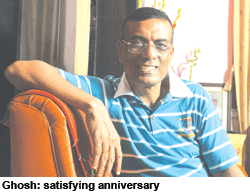 Determined to give children who have dropped out of school a second chance, in 2008 Kolkata-based Chandra Shekhar Ghosh, a senior Ashoka Fellow and promoter-director of Bandhan Microfinance (estb. 2001), promoted ten free schools in South 24-Parganas in rural West Bengal for underprivileged children. Since then, the number of Bandhan remedial schools has grown to 352 in ten districts of the state including North 24-Parganas, Malda, Murshidabad, Nadia, Birbhum, Howrah, Jalpaiguri, Cooch-behar and Darjeeling. These schools are managed by Bandhan Konnagar, a registered society, the CSR (corporate social responsibility) arm of Bandhan Microfinance — one of India’s largest microfinance companies (loans adva-nced: Rs.15,593 crore in 2011-12).
Determined to give children who have dropped out of school a second chance, in 2008 Kolkata-based Chandra Shekhar Ghosh, a senior Ashoka Fellow and promoter-director of Bandhan Microfinance (estb. 2001), promoted ten free schools in South 24-Parganas in rural West Bengal for underprivileged children. Since then, the number of Bandhan remedial schools has grown to 352 in ten districts of the state including North 24-Parganas, Malda, Murshidabad, Nadia, Birbhum, Howrah, Jalpaiguri, Cooch-behar and Darjeeling. These schools are managed by Bandhan Konnagar, a registered society, the CSR (corporate social responsibility) arm of Bandhan Microfinance — one of India’s largest microfinance companies (loans adva-nced: Rs.15,593 crore in 2011-12).
Newspeg. In April, Bandhan pre-primary schools completed their first year of operations. Ghosh is satisfied that they’ve played a great role in preparing children for primary school education. Currently 170 pre-primary schools with 5,361 students are being run by Bandhan Konnagar in all districts (except Malda) with Bandhan remedial schools.
History. Founded by Ghosh in 2001, Bandhan Microfinance has developed into one of the few successful micro lending institutions of India. Currently, it is active across a wide geography of 18 states reaching 3.6 million rural women through its 1,553 branches. Besides microfinance, Bandhan provides other support services viz. remittance (in association with Western Union) and pension (in association with Pension Fund Regulatory & Development Authority of the Union government), while Bandhan Konnagar reaches over 400,000 households in five states of the Indian Union.
Direct talk. “Behavioural changes are quite evident in our children, who are either school drop-outs or were reluctant to go to school. By creating joyful and conducive environments within our schools, we re-kindle the interest of children in learning and also develop positive mindsets within communities of mostly illiterate parents. After they complete upper primary educa-tion, most of our children are mainstreamed into govern-ment schools. Moreover right from the beginning we have been developing a para profes-sional teachers cadre with special emphasis on training women para teachers for providing remedial education to children enroled in the society’s schools,” says Ghosh, an alumnus of Dhaka University and Harvard Business School.
Future plans. With the Bandhan school model now stabilised and working smoothly, Ghosh is all set to scale up the education activities of the Bandhan Konnagar Society. “We intend to establish 2,500 schools with 75,000 students in the next three years, subject to availability of funding,” says Ghosh.
Fair winds!
Baishali Mukherjee (Kolkata)